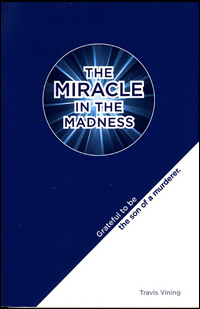 The Miracle in the Madness — Grateful to be the son of a murderer, by Travis Vining
The Miracle in the Madness — Grateful to be the son of a murderer, by Travis Vining
Review by Donna Andersen
The following article refers to spiritual concepts. Please read Lovefraud’s statement on Spiritual Recovery.
Travis Vining is the son of a sociopathic serial killer. His father, John Bruce Vining, killed four people, and coerced Travis, as a young man, into helping him escape prosecution.
How does anyone cope with that?
Travis tried to forget what happened, and he did, sort of. His psyche repressed direct memory of many incidents. But the efforts of his mind had repercussions in his body. Travis had all kinds of physical problems, ranging from rashes to addiction to prescription medications, which over time became debilitating. He was in so much physical and emotional pain that eventually he felt that, even though he considered himself to be an atheist, the only thing left for him to do is pray.
And that’s when the miracles began.
Travis originally told his story in his first book, Transforming Darkness to Light for Giving. Now he’s written another book called, The Miracle in the Madness – Grateful to be the son of a murderer.
In his new book, Miracle in the Madness, Travis summarizes the drama of his personal story and spends more time explaining how his spiritual work enabled him to find peace. He writes:
“Surprisingly, it was not in spite of my difficulties and suffering that I was able to find my freedom, but because of them. The process required a simple willingness to look directly at the madness that led me to the answers. This is the miracle that I found hidden, waiting in the madness, and forgiveness was literally the invitation that appeared to trigger this extraordinary response.”
This book is full of insight. Here are some passages that resonated with me as profound truths:
“Some say time heals all wounds, but this is an illusion at best. In reality, time does not create distance from our hurtful life experiences; it only distorts and intensifies the pain from them. The unresolved issues and grievances from our past become infected wounds hidden deep within us.”
“Being a victim removed personal responsibility for my happiness. It was the opposite of acceptance as it generated an unwavering commitment to the belief that the past should have been different. A closer look revealed that the cost of participation in this was enormous, basically robbing me of any chance at peace.”
“The key to healing past hurts is forgiveness of those that harmed you, and yourself. Once these experiences were exposed to the light and forgiven, I found that they no longer had any power over me.”
In his book, Travis describes the “frame of judgment,” an attitude guarded by each person’s ego and mind that prevents compassion, love, tolerance and forgiveness from entering our lives. He explains how to dismantle the frame of judgment, which enables more compassion for ourselves and others.
“We too often view misfortune as an attack, an intrusion in life, and see ourselves as victims,” he says. “In an odd twist of irony, these unforgivable experiences in life actually hold the key to our freedom from suffering. The story, and process outlined in The Miracle in the Madness, reveals exactly how to transform this misery into a priceless gift.”
Travis hopes in writing this book to offer his story as a real life example of how changing one’s perception about a horrific experience could lead to true healing. For all of us who have endured pain and betrayal inflicted by a sociopath, it may be an approach worth considering.
The Miracle in the Madness – Grateful to be the son of a murderer is available on Amazon.com.



































